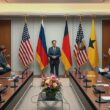The United States is reportedly preparing to resume nuclear weapons testing for the first time in over three decades, a move announced by former President Donald Trump via his Truth Social platform. The declaration, seemingly intended to project American strength and respond to perceived provocations from rival nations, throws into question decades of non-proliferation efforts and risks escalating global tensions.
Trump’s post asserted that the U.S. possesses a nuclear arsenal exceeding that of any other nation and highlighted a previously undertaken modernization and renewal program during his first term. He justified the impending tests, described as a difficult decision, citing the “enormous destructive power” involved and the necessity of matching the nuclear activities of other states. The timing of the announcement, delivered through a personal social media channel rather than a formal government statement, has drawn immediate criticism regarding its lack of transparency and potential for misinterpretation.
The announcement directly challenges the Comprehensive Nuclear-Test-Ban Treaty (CTBT), which the U.S. signed but never ratified. Critics warn that resuming testing could trigger a domino effect, prompting other nuclear powers to follow suit and destabilizing the fragile international security landscape. Concerns are being raised within the Biden administration and among allied nations regarding the potential impact on arms control negotiations and the overall credibility of non-proliferation commitments.
While the specifics of the testing program remain unclear, experts anticipate that any resumption would be framed as defensive and designed to assess the reliability of existing weapons systems – a familiar tactic employed to circumvent international scrutiny. However, the implicit messaging surrounding the announcement, emphasizing projected power and a perceived need to respond to competitor actions, raises deeper questions about the current administration’s strategic thinking and willingness to prioritize diplomatic solutions in a rapidly evolving geopolitical climate. The potential for miscalculation and unintended consequences, particularly given the volatile state of international relations, is a significant and pressing concern.





